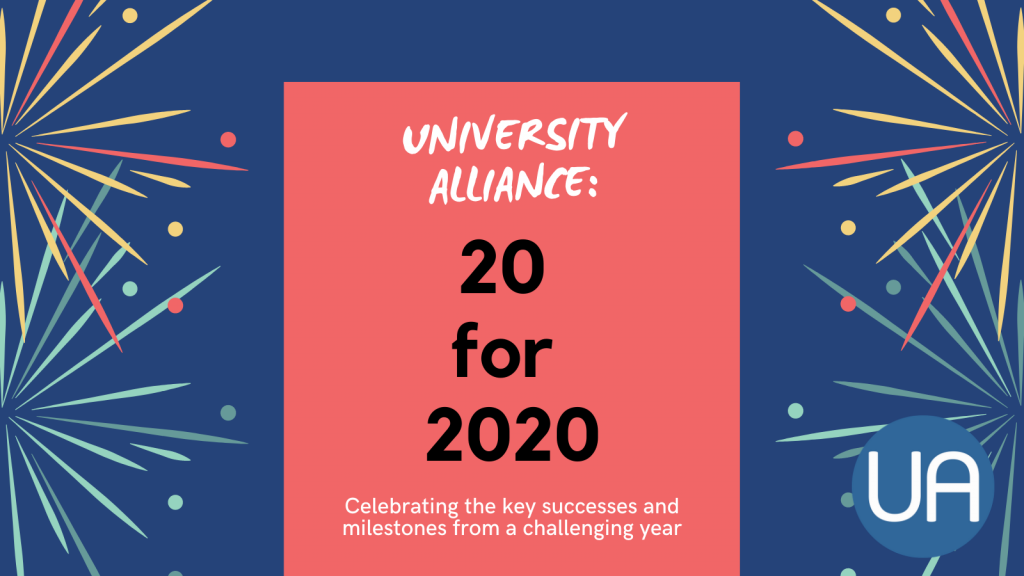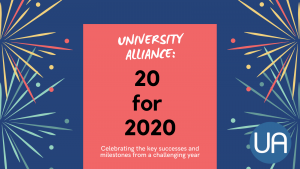 For our ‘Year in review’ series, we have asked colleagues and friends from the UA team and across the Alliance to share with us their highlights, and achievements, from the year.
For our ‘Year in review’ series, we have asked colleagues and friends from the UA team and across the Alliance to share with us their highlights, and achievements, from the year.
This year may have been difficult and immensely challenging at times, but throughout it, we have worked with our members to respond to the changing circumstances and we are proud as a mission group to represent such inclusive and hardworking institutions that have aided their communities and supported staff and students through a difficult year; all whilst continuing to play a vital role in the UK’s cultural, social and economic futures.
Whilst for the UA team it certainly hasn’t been ‘business as usual’, we are pleased that we have still been able to strengthen our partnership working as an Alliance and with our external stakeholders, raised the profile of our members and built on the successes of our DTA programme.
From the team at UA, this is our ’20 in 2020’.
1. We kicked off the year with the launch of a new 3 year strategic plan for University Alliance with an ambitious new vision, mission, strategies, objectives and principles co-designed with members and staff at UA
2. We hosted a series of successful roundtables with senior politicians, leaders and government officials, to facilitate opportunities for our members to engage with decision makers to discuss topical issues.
Some of these included meetings with: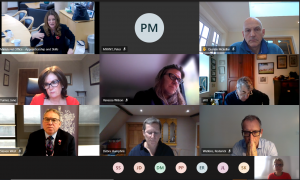
- Chair of the Education Select Committee, Robert Halfon MP
- Executive Chair of Research England, David Sweeney
- Chief Executive and Chief Nurse from Health Education England
- Director for Post-16 Strategy at the DfE, Keith Smith
- Chief Executive and Chair from Innovate UK
- Skills and Apprentices Minister, Gillian Keegan
- Shadow Universities Minister Emma Hardy MP
- Sir Michael Barber, Chair of the OFS
- Nicola Dandridge, CEO of the OFS
3. We have significantly expanded the networks available to professional and academic staff within our universities, with 25 new networks emerging as a response to the pandemic. We are now regularly facilitating over 30 networks of senior leadership, academic, professional, student and administrative staff across our universities, many of whom have been at the forefront of their institutional response to the pandemic. These networks have been a useful forum for the sharing of ideas, practice and resources, and a vital source of support as Alliance universities navigated the challenges of the last 12 months.
 4. We wrote an open letter to the Government calling for greater transparency and clarity on the UK Shared Prosperity Fund which was signed by 70 universities and businesses and covered in-depth on BBC Newsnight.
4. We wrote an open letter to the Government calling for greater transparency and clarity on the UK Shared Prosperity Fund which was signed by 70 universities and businesses and covered in-depth on BBC Newsnight.
5. The Doctoral Training Alliance went virtual, delivering four online residential events and 55% more elective workshops than previous years (21 in total) on a range of subjects, including research skills, wellbeing, motivation, presentation and influencing skills to name a few. DTA researchers were given the opportunity to showcase their research to the wider DTA community, engage with sector relevant speakers and join virtual social events to support their connectivity whilst working remotely.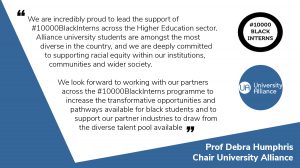
6. University Alliance partnered with the 10,000BlackInterns programme, dedicated to offering paid internships, training and development opportunities for black students, in a commitment to transforming the horizons and prospects of young Black people. University Alliance will be offering a paid internship as part of the scheme.
7. We gave evidence to the Education Select Committee, as part of their inquiry into the impact of COVID on education services. The chair of University Alliance, Professor Debra Humphris, gave evidence on the work that Alliance universities are doing to support staff and students during the crisis.
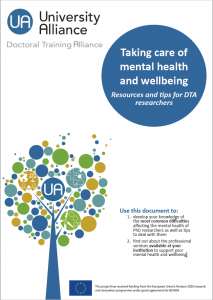 8. The DTA developed a mental health booklet for researchers, which offers guidance on taking care of health and wellbeing during postgraduate research programmes – particularly in sight of the constraints and challenges imposed by COVID-19. Dr Ellie Crabtree, UA’s programmes administrator wrote for HEPI on the importance of properly supporting PHD researcher’s wellbeing and mental health.
8. The DTA developed a mental health booklet for researchers, which offers guidance on taking care of health and wellbeing during postgraduate research programmes – particularly in sight of the constraints and challenges imposed by COVID-19. Dr Ellie Crabtree, UA’s programmes administrator wrote for HEPI on the importance of properly supporting PHD researcher’s wellbeing and mental health.
9. The University Alliance welcomed 3 new members to the group: Birmingham City University, Leeds Beckett University and Anglia Ruskin University.
10. Through the ministerial taskforce we made urgent representations for more support for teaching and healthcare placements, and as a consequence, Health Education England was awarded £15m funding for healthcare placements, a 50% increase on the funding previously pledged. We also lobbied for a capital fund for universities to help unlock space and facilities to accommodate students on popular courses avoiding the need for deferrals, and we presented detailed information on the financial impact of Covid-19 on Alliance university finances. We played our part in influencing the end of Term and January return guidance reflecting the needs of our members and their students.
11. We authored and co-authored a number of impactful submissions, articles and blogs on research policy, for the Ministerial Research Task Force, the Research & Development (R&D) Road Map consultation, Innovate UK, the BEIS Committee, Science and Technology committee, and the Education Committee.
12. Our core recommendation to government on care leavers, featured in a comment piece in the Guardian, is now the subject of a feasibility study commissioned by OfS.
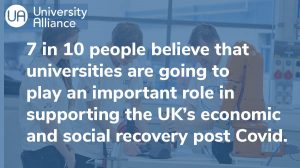
13. We contributed to the OfS’s review of digital teaching and learning by holding an interactive session with Sir Michael Barber, Chair of OfS, and our Teaching and Learning Network, which we followed up with a written submission based on the session.
14. We ran a public poll to demonstrate the level of support for our members’ roles during the pandemic and in the post – Covid economic recovery; the findings of which will inform our strategic planning to the recovery and regeneration response.
15. We moved our annual summit online with exciting and diverse speakers and sessions from the world of politics and government and launched the first Alliance awards.
16. We secured prominent media profiles in sector and national media including comment pieces and broadcast for UA spokespeople, as well as fielded bids to our members resulting in strong representation from UA members and landing of key messages.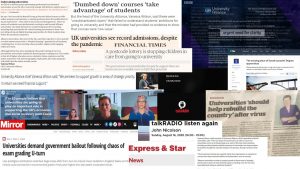
17. We successfully completed our recruitment of over 70 researchers from 27 different countries to the Horizon2020 MSCA Cofund supported DTA3 programme and supported two researchers to secure the new UKRI Global Talent Visa.
18. We established a DTA3 ESR/Student representative committee to allow the postgraduate doctoral student voice to be amplified and integral to the development of the programme.
19. We engaged closely with DfE on the higher technical education consultation through membership of the HE stakeholder group and meetings with key officials. This resulted in an improved, less burdensome regulatory model for approving higher technical qualifications than was originally proposed.
20.Our DTA collaborations extended beyond our members to a wide range of external organisations including the University of Liverpool, University of Barcelona, Unilever, the NHS, Hewlett Packard and Nokia Bell to name a few, with external supervisors from Italy, America, Switzerland, Pakistan and Australia.

